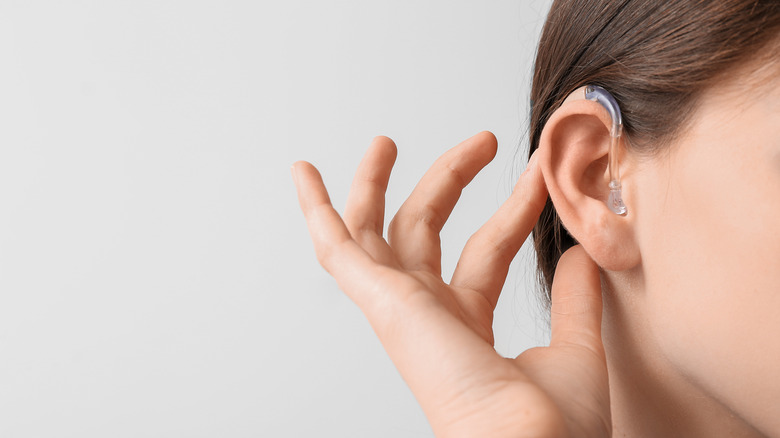Read This Before Getting An Over-The-Counter Hearing Aid
For those dealing with mild to moderate hearing loss, a new option is hovering on the horizon that could make life a little easier. In the next year or so, over-the-counter (OTC) hearing aids are likely to become available to consumers, making the often cumbersome and expensive process of getting a hearing aid easier, faster, and cheaper.
Before OTC hearing aids can actually be sold, the Food and Drug Administration (FDA) must first publish proposed regulations for the new category of devices and then open them to a 60-day public comment period before publishing final regulations — a process that was initiated in 2017 (via Forbes).
OTC hearing aids were first promoted in response to the difficulties many people experience when trying to get help for hearing loss via the traditional route. Normally, you have to first have an appointment with an audiologist or other hearing health professional to diagnose the level of hearing loss and rule out any underlying medical issues that may be causing it. The audiologist then selects a hearing aid out of a limited number of brands that he or she contracts with and the price is often prohibitively steep — $5,600 a pair on average — and not covered by many insurance plans (via WebMD).
OTC hearing aids promise to be cheaper and more accessible
Buying OTC hearing aids from a retail store promises convenience, ease, and a significantly lower price tag. But not everyone is cheering the change. Some worry that without consulting a hearing health professional, customers will end up choosing products that are not the best fit for their particular needs and may even make their hearing problems worse.
Lindsey Jorgensen, a professor at the University of South Dakota and board member of the American Academy of Audiology, told Health, "Although choosing a hearing aid may seem like an easy decision, there are many steps and considerations that go into finding the right device that meets your needs and expectations. Hearing loss is not a simple fix, and without a strong knowledge of what a hearing aid can and cannot do, you may not be choosing the right one for you."
A happy medium between traditional hearing aids and OTC ones may be direct-to-consumer hearing aids, which are already available on the market from companies like Eargo and Audicus. These are more affordable than traditional hearing aids, while meeting the same FDA regulatory standards and also providing virtual support from company-employed audiologists when necessary.


